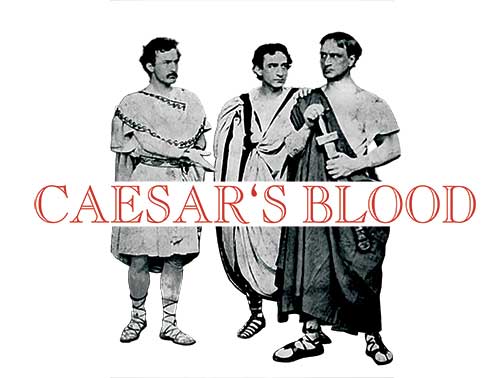CEDAR CITY — In November 1864, just weeks after Abraham Lincoln’s reelection, John Wilkes Booth and his two brothers, Edwin and Junius, gave an acclaimed performance of Julius Caesar in New York City. In his day, John Wilkes Booth was considered the handsomest man in America and the second-most accomplished actor in the country, upstaged only by his older brother Edwin. That evening was famous in its day for uniting a famous family who were divided, like the rest of the country, over slavery and the war between the Union and the Confederacy. John’s commitment to the Confederacy is now infamous, but at the time his brother Edwin’s outspoken Unionism was equally well-known.

Rich Rubin’s script takes place in the Booths’ dressing room before and after the play. Their mother, Mary Ann Booth, and Edwin’s valet, Benjamin Waters. Both stoke the brothers’ constant rivalries as siblings, competing actors, and political foes. Mary Ann plays favorites with John and, in the way of parents, subjects any new acquaintance—in this case Benjamin—to endless anecdotes about her children. Benjamin Waters, a black man and free in the North, is everyone’s prop: a fresh ear for Mary Ann’s stories, a means for Edwin to show how forward-thinking he is, and an intruding animal John wants out of eyesight and earshot.
Despite being little but conversation, Rubin’s script is gripping. Individuals enter and exit the dressing room backstage of a play the audiences never see. The Booth brothers apply stage makeup and stare into mirrors. And the entire time Edwin and John vie for their mother’s approval and for political sway and are only kept from erupting into a shouting match by the mediating presence of their oldest brother Junius.
The Booth family and their relationships were simultaneously familiar and terrifyingly dysfunctional. Junius (Michael C. Thatcher) and Edwin (Sam Ashdown) portrayed a close relationship of shared views and humor, where Edwin’s affectionate ribbing was repaid with Junius’s kindness and brotherly guidance. Mary Ann’s (Saren Nofs-Snyder) eccentric doting was born good-humoredly by all of her sons, and though her favoritism was often the source of contention between John (Zack Powell) and Edwin, all three brothers were united in knowing looks and eye rolls as she spouted her long-winded tales of little consequence to Benjamin.
Benjamin Waters (Oge Agulué) and the Booths’ interactions with him were among the most captivating aspects of the play. In the face of John’s contempt for all people of color, Edwin and Junius profess to see Benjamin as an equal. Yet Edwin treats Benjamin like a slave. In Edwin’s presence, Benjamin casts his eyes downward obeisantly, and Edwin is aghast at any sign of independence or self-respect on Benjamin’s part. Benjamin maintains his composure as people talk about him instead of to him, assign him feelings and ideas, insult him and ignore him, which makes it all the more striking when he does express his own feelings.
Though still a draft, Rubin’s script read like a polished work ready for production. The actors were completely convincing in their roles and read their parts as though they had been written just for them. Director Joshua Stavros’s production of Rubin’s script flowed with momentum that engrossed me so fully that I was amazed when I learned that rehearsals had only begun a week prior to this reading. And I can’t wait to see what becomes of this script when it’s completed and produced as a full play.
[box type=”shadow”]The remaining Utah Shakespeare Festival staged reading of Caesar’s Blood is August 27 at 10 AM in the Auditorium Theatre on the campus of Southern Utah University. Tickets are $10. For more information, visit www.bard.org/napp.[/box]
